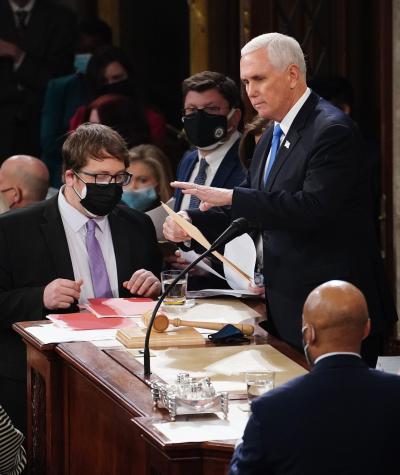Last week, Rep. Mike Johnson — a “key architect of Republicans’ objections to certifying Mr. Biden’s victory on Jan. 6,” according to the New York Times — was elected speaker of the U.S. House of Representatives.
It’s important to understand that our elections are safe, secure and accurate. Yet someone who refuses to acknowledge the legitimacy of the 2020 election is now second in line to the presidency — and continuing to sow distrust in our electoral processes as we head into a crucial election year.
Rep. Johnson’s ascension to the speakership illustrates why CLC’s efforts to update the Electoral Count Act (ECA) last year were so important.
Even though the House speaker has no meaningful role to play in certifying a presidential election, partisan politicians — including many members of the U.S. House — exploited the ambiguity of the antiquated law to sow distrust as part of an organized effort to overturn the 2020 election.
Originally passed in 1887, the ECA was an archaic law that provided the primary legal framework for casting and counting Electoral College votes in presidential elections.
For more than a century, the ECA set a timeline for selecting electors and transmitting their votes to Congress, established procedures for how Congress counts the electoral votes, and cemented the role of the vice president, who presides over this process under the 12th Amendment as the president of the Senate.
However, until last year, the original text of the ECA had not been updated since it was first enacted more than 130 years ago. This law was rife with imprecise language, gaps and ambiguities that former President Donald Trump and his allies attempted to exploit — and which ultimately culminated in the disastrous January 6 attack on our democracy.
But last year, thanks in part to CLC’s advocacy, a group of bipartisan lawmakers led a coalition to create and pass the Electoral Count Reform Act of 2022, which provided much-needed updates to the original ECA that make it harder for Congress to subvert future presidential elections.
CLC’s work hasn’t stopped there, though. Now that the ECRA has been passed, it needs to be implemented — and, since its passage last year, CLC has worked tirelessly alongside state allies to make sure the ECRA is properly implemented, including by updating state law and election procedures ahead of next year’s crucial elections.
It’s undoubtedly worrisome that an election denier has ascended to sit second in line to the presidency, even if the House speaker has no role to play in the presidential election certification process.
But because of CLC’s work alongside our partners, the ECRA ensures that attempts to subvert presidential elections in Congress are now exceedingly unlikely to achieve success. In our democracy — in which every vote should be counted and every voter should have the opportunity to make their voice heard — that is a step in the right direction.

